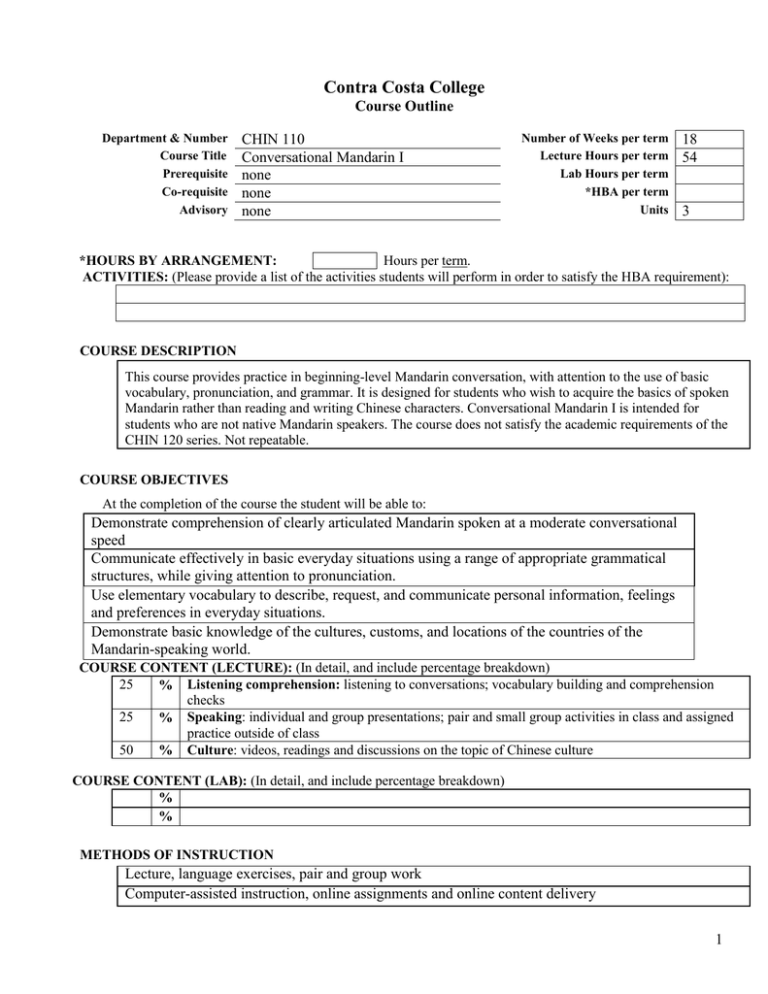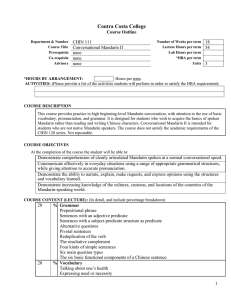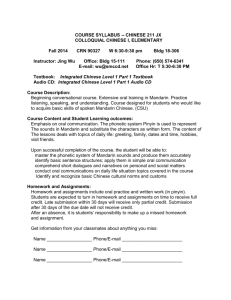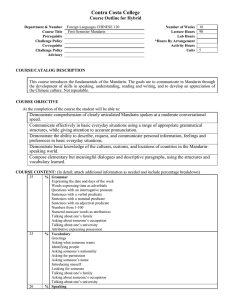CHIN 110-F13.doc 288KB Feb 18 2014 10:41:03 AM
advertisement

Contra Costa College Course Outline Department & Number Course Title Prerequisite Co-requisite Advisory CHIN 110 Conversational Mandarin I none none none Number of Weeks per term Lecture Hours per term Lab Hours per term *HBA per term Units 18 54 3 Hours per term. *HOURS BY ARRANGEMENT: ACTIVITIES: (Please provide a list of the activities students will perform in order to satisfy the HBA requirement): COURSE DESCRIPTION This course provides practice in beginning-level Mandarin conversation, with attention to the use of basic vocabulary, pronunciation, and grammar. It is designed for students who wish to acquire the basics of spoken Mandarin rather than reading and writing Chinese characters. Conversational Mandarin I is intended for students who are not native Mandarin speakers. The course does not satisfy the academic requirements of the CHIN 120 series. Not repeatable. COURSE OBJECTIVES At the completion of the course the student will be able to: Demonstrate comprehension of clearly articulated Mandarin spoken at a moderate conversational speed Communicate effectively in basic everyday situations using a range of appropriate grammatical structures, while giving attention to pronunciation. Use elementary vocabulary to describe, request, and communicate personal information, feelings and preferences in everyday situations. Demonstrate basic knowledge of the cultures, customs, and locations of the countries of the Mandarin-speaking world. COURSE CONTENT (LECTURE): (In detail, and include percentage breakdown) 25 % Listening comprehension: listening to conversations; vocabulary building and comprehension checks 25 % Speaking: individual and group presentations; pair and small group activities in class and assigned practice outside of class 50 % Culture: videos, readings and discussions on the topic of Chinese culture COURSE CONTENT (LAB): (In detail, and include percentage breakdown) % % METHODS OF INSTRUCTION Lecture, language exercises, pair and group work Computer-assisted instruction, online assignments and online content delivery 1 Audiovisual materials, including maps, video, audio, Internet Guest speakers Conferences as needed INSTRUCTIONAL MATERIALS: NOTE: To be UC/CSU transferable, the text must be dated within the last 7 years OR a statement of justification for a text beyond the last 7 years must be included. Textbook Title: Author: Publisher: Edition/Date: Textbook Reading Level: Justification Statement: Success with Chinese De-An Wu Swihart, Cong Meng Cheng & Tsui 2nd edition, 2013 Author name: De-An Wu Swihart, Cong Meng Title of textbook: Success with Chinese Year the book was published: 2nd edition, 2013 Universities where the text is currently being used: The textbook Success with Chinese, is adopted by the University of California- Berkeley, the University of California- Davis, the University of San Francisco, and some other major universities for their conversational Chinese courses. The publisher Cheng and Tsui is a well-known and the biggest publishing company in the North America for Asian language textbooks at college level. Textbook Title: Supplementary teaching materials Author: course instructor Publisher: Edition/Date: 2014 Textbook Reading Level: Justification Statement: Suggested but not required: Textbook Title: Author: Publisher: Edition/Date: Textbook Reading Level: Justification Statement: Experiencing Chinese: Experiencing Culture in China Zheng Xiao Yu Higher Education Press 2010 OUTSIDE OF CLASS WEEKLY ASSIGNMENTS: Title 5, section 55002.5 establishes that a range of 48 -54hours of lecture, study, or lab work is required for one unit of credit. For each hour of lecture, students should be required to spend an additional two hours of study outside of 2 class to earn one unit of credit. State mandates that sample assignments must be included on the Course Outline of Record. Outside of Class Weekly Assignments Weekly Reading Assignments (Include detailed assignment below, if applicable) Hours per week 3 Textbook study. Students are required to listen to the textbook audio and practice the new words and grammar. Weekly Writing Assignments (Include detailed assignment below, if applicable) Weekly Math Problems (Include detailed assignment below, if applicable) 3 Lab or Software Application Assignments (Include detailed assignment below, if applicable) Other Performance Assignments (Include detailed assignment below, if applicable) 3 Listening and speaking practice. See sample below: You and your partner can pick one of the topics below to discuss; create a dialog based on the topic; rehearse it; then perform it on the day of the quiz. Here are the topics: 1. 2. 3. 4. Visiting a friend's home. Talking about the location of an action. Talking about actions in the past. Talking about actions that happen later than expected. Your conversation should include greetings and parting expressions and each person must include at least 4 of the following structures: a. 因为…所以… b. 觉得 c. 在 d. adjective as predicate e. 吧 f. completion了 g. 才 h. 要是 (就) Your grade will be based on the following criteria: 1. Richness of content 2. Comprehensibility, including: a. pronunciation b. correct grammar c. appropriate vocabulary (especially recent vocabulary) 3. Comprehension (of what your partner says) 4. Fluency and flow of the conversation Each conversation should be about three minutes long. STUDENT EVALUATION: (Show percentage breakdown for evaluation instruments) Course must require use of critical thinking, college-level concepts & college-level learning skills. For degree credit, course requires essay writing unless that requirement would be inappropriate to the course objectives. If writing is inappropriate, there must be a requirement of problem-solving or skills demonstration. 4 % Essay (If essay is not included in assessment, explain below.) 50 % % Computation or Non-computational Problem Solving Skills Skills Demonstration: listening and speaking skills 20 % Objective Examinations: quizzes, tests, presentations Other (describe) 20 10 % % Homework Class Participation GRADING POLICY (Choose LG, P/NP, or SC) Letter Grade Pass / No Pass 90% - 100% = A 80% - 89% = B 70% - 79% = C 60% - 69% = D Below 60% = F 70% and above = Pass Below 70% = No Pass Prepared by: Date: X Student Choice 90% - 100% = A 80% - 89% = B 70% - 79% = C 60% - 69% = D Below 60% = F or 70% and above = Pass Below 70% = No Pass Yachi Teng November 2013 Form Revised 09/13 5


